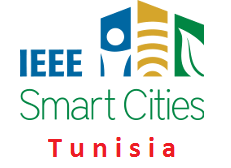Welcome

The IEEE Tunisia section is dedicated (under the IEEE Smart Cities Initiative) to assist Tunisian municipalities with the transition into more intelligent, sustainable urbanized environments.
Welcome, the IEEE Smart Cities Initiative spans multiple IEEE Societies and is designed to be a trusted voice in smart cities for the engineering, computing and technology communities around the world.
The initiative offers a Technical Community, through which IEEE seeks to help municipalities around the world address urban population growth by providing education, insight and expertise, and creating a forum for collaboration of all entities involved in planning successful “smart cities”.
The IEEE Smart Cities Initiative has the following objectives:
- Create a vibrant and worldwide cities network
- Share knowledge, experience and good practices
- Involve local governance, universities, industries and at first, local IEEE volunteers
- Manage the transition to urbanization
- Raise awareness of the benefits and downsides of technology
- Help guide the appropriate uses of technology
- Associate with other international organizations
Further details: http://smartcities.ieee.org/
IEEE affiliate smart cities
IEEE Affiliated Smart Cities program provides the following benefits to participating cities:
- Permission to use the “IEEE Affiliated Smart City” brand in any official communication;
- Opportunity to promote the city’s developments through the IEEE Smart Cities web portal, with contributed articles or whitepapers to inform the world of plans and progress on the city’s “smartification” process. Each city will have its own web page;
- Preferred speaker registration in IEEE Smart Cities Initiative conferences
- Ability to nominate candidates to join the IEEE Smart Cities Initiative Expert Committee;
- Opportunity to participate in the kick-off workshops of newly selected core cities;
- Receive complimentary access to IEEE Smart Cities Initiative white papers and a preferred access to the courses being developed by IEEE Core Smart Cities Initiative;
- Opportunity to join other initiatives (hackathons, working groups, etc.) that are organized by associations or institutions with close links to IEEE, or that are recommended by IEEE Smart Cities Initiative;
- Ability to raise discussions on the smartification topics that are at the heart of your city’s smartification plan, as a member of a worldwide network of cities.
The IEEE Smart Cities Steering Committee selected the following affiliated cities from Tunisia:
IEEE core smart cities
Selected core cites applications will provide clear, compelling evidence that the submitting municipality is well-positioned to utilize the resources offered through the IEEE Smart Cities Initiative, that its proposed evolution to a smart city has the potential to substantially enhance a city’s capacity to act on key issues and that the city can demonstrate plans to invest human and financial capital into the project.
Requirements:
- A municipality must demonstrate that it already has a comprehensive plan and funds for the smart city evolution effort
- Local constituencies—municipality, industry, universities, etc.—must agree to involve IEEE in the planning and design of the smart city project
- Local authorities must be willing to share experiences at an international level
- A local IEEE Chapter and Section must exist to take local responsibility and support the project for the workshop – and additional activities in the future
- A local university or group of universities must be interested in working the smart cities space, and some form of local industry commitment must exist
- Universities must have a curriculum, as well as Masters and PhD programs, in smart cities or in subject areas related to smart cities
- Universities have the necessary skills and resources in designing and running Massive Open Online Courses (MOOCs)
- The necessary infrastructure to organize international conference is available
- The selected city must be able to plan, arrange and conduct their workshops
The activities that will be conducted by the selected cities will be divided in two phases:
PHASE ONE:
- Organizing and hosting of a kick-off workshop
- Organizing thematic working groups
- Producing initial versions of white papers, position papers, and guidelines
PHASE TWO:
- Producing updated versions and new white papers, position papers, and guidelines
- Choosing 10 master students and 2 PhD students to work on selected topics with the working groups
- Designing and building 4 MOOCs
- Organizing and hosting an international IEEE Smart City conference. These events take place every two years.
The IEEE Smart Cities Steering Committee selected the following 5 core cities:
5 other core cities will be selected in futrue calls.
About Smart Cities
As world urbanization continues to grow and the total population expected to double by 2050, there exists an increased demand for intelligent, sustainable environments that reduce environmental impact and offer citizens a high quality life.
A smart city brings together technology, government and society to enable the following characteristics:
- Smart Economy (Innovation, Entrepreneurship, Productivity, Flexibility labor market, E-Business, E-Commerce)
- Smart Mobility (Availability of ICT infrastructure, Accessibility to safe transportation systems, Sustainable & intelligent transport systems)
- Smart Environment (Reducing pollution, Environmental protection, Sustainable resource management, Smart renewable energy)
- Smart People (E-skills, Flexibility, Creativity, Participation in public life, Open mindedness)
- Smart Living (Improving health conditions, High housing quality, Educational & cultural facilities, Touristic attractivity)
- Smart Governance (Participation in decision-making, Transparent governance, Public and Social services, Innovative Political Stratégies)
Our Partners
IEEE Tunisia section is cooperating with the following partners:
- Governance (ministries, municipalities, public institutions, etc.)
- Universities and research centers
- Industries (private companies)
- People (citizens, independent experts, non-profit organizations, etc.)



